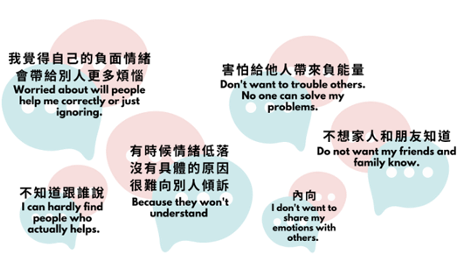BACKGROUND
Help-seeking barriers among youths

While schools can be a resourceful place for students in need, many students may not want to seek help directly from school adults or use traditional resources. Reasons for this include not feeling understood by adults, or not wanting others to know that they are seeking help.
Our study from 2013-2016 of 35 student suicide cases showed that 74% of the cases were experiencing emotional distress related to school, and did not show obvious warning signs. This raised concerns for us. (Wong et al., 2022 https://doi.org/10.1186/s12889-022-12983-7)
Based on our findings from Quality Education Fund and HKJC Open Up surveys, 75% of students know where to seek help, yet only 35% actually seek help in action.
A survey in March 2022 reveals that 57% students are unwilling or unsure about seeking help even when needed. Reasons include :

S.H.I.E.L.D.S. will address these help-seeking barriers by training students to be empathetic and proactive peer leaders who become an alternative source of support for students less willing to seek help. Part of our training will teach students to recognize peers in distress and reach out to support them safely and effectively.
Therefore, peer support is an an important element in our program.
The Role of Peer Support
Social support is an essential protective factor in suicide prevention. Research shows that perceived social support from school, peers and family play a critical role in the prevention of suicidal ideation and attempts. Higher social support may prevent suicidal ideation by increasing other protective factors such as self-esteem and feelings of belonging. The companionship and presence of peers can help students cope with stressful events and negative emotions, which may reduce suicide risk.
Peer support is not a replacement for professional help. But peers can act as gatekeepers who can look out for and support each other, so that students in need can feel cared for and be encouraged to seek relevant resources, preventing problems from getting worse.
What is a mental health gatekeeper?
Gatekeepers are regular people – like you and me – who have basic skills in recognizing signs of suicide or distress and can be an initial source of support for people in need and help refer them to relevant resources. It has been shown to be a promising approach to community suicide prevention and enhancing help-seeking.
In schools, for students in need who may be reluctant or unsure where to seek help, trained peers who are equipped with knowledge and a supportive attitude about mental health, as well as basic skills in listening and caring, can become a key source of support, so that the needs of at-risk students are met.
